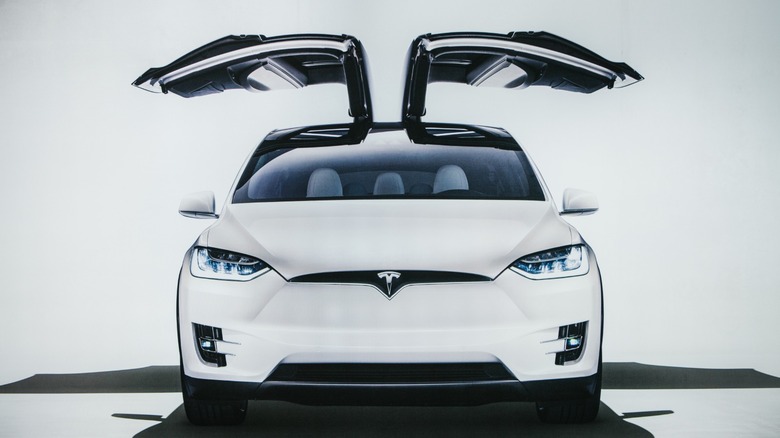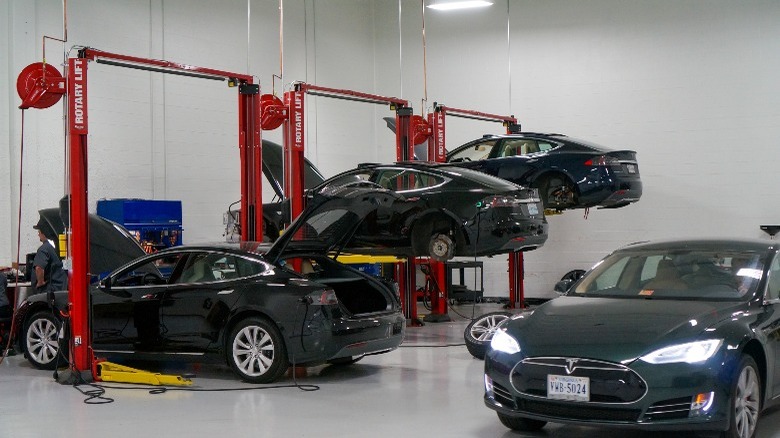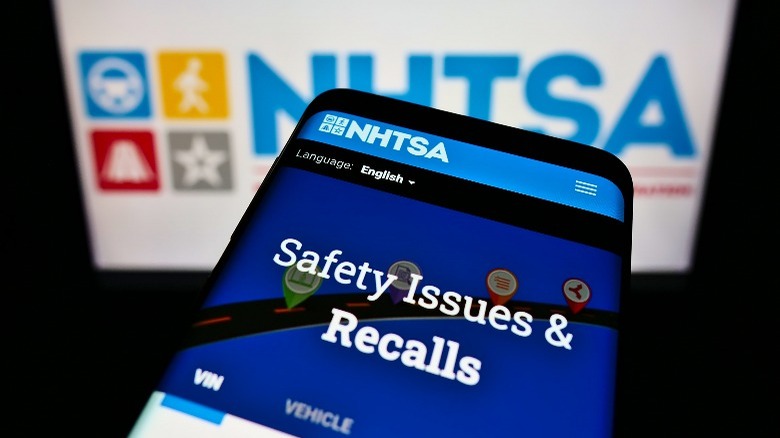Here's Why The Experts Say You Should Stay Away From The Tesla Model X
Tesla has led the charge in the electric vehicle revolution for a long time, despite having earned itself a bit of a reputation for quality control issues thanks to uneven panel gaps, questionable paintwork, and misaligned interior trim. Alas, the Model X is one of Tesla's least popular vehicles, having sold around 118,967 units in the U.S. since its inception in 2015 (via GoodCarBadCar), as opposed to the more popular Model Y, which sold 161,529 units in the U.S. in 2021 alone (via Carsalesbase).
Tesla's Model X has been around for a few years, but that doesn't make it any less of an impressive vehicle, from a visual and performance standpoint. The "Falcon Wing" doors alone make it stand out among other luxury SUVs, while its large, low-set battery and dual-motor all-wheel drive system deliver excellent performance and great handling considering its weight and size. According to Tesla, the Model X reaches 60 mph in 3.8 seconds, delivers 670 hp peak power, and can go up to 348 miles on a single charge. The Model X Plaid steps things up further, dropping the zero-to-60 time to an eye-watering 2.5 seconds. It's unfortunate, then, that research suggests that the Model X is a poor choice if you want a reliable vehicle.
Consumer Reports data suggests the Model X is unreliable
Consumer Reports, the organization that reviews and researches vehicles and compiles data about vehicle reliability and recalls, does not recommend the Tesla Model X for a number of reasons. Perhaps most importantly, the group found the Model X had reported issues with the suspension, climate control, electronics, paint, and trim.
The Falcon Wing doors, in particular, proved to be a sticking point. Consumer Reports's owner surveys and owner reviews on Edmunds both cite frustrations that stem from motors that open the rear doors too slowly to frustrations with the touch-sensitive door handles. Consumer Reports also found Tesla's implementation of onboard technology, like the blindspot warning system and the minimalist interior interface, lacking both in features and user friendliness.
Furthermore, complaints from Edmunds consumer reviews indicate that Tesla's after-sales service could also use some work. One Model X driver reported that they had experienced frustration and delays booking an appointment at the nearest service center. After finally getting an appointment and being told the rear drive unit needed replacing, the driver was declined a rental vehicle, instead given $800 in Uber vouchers, which didn't work for them because they had a job that demands travel. When they shared their review, Tesla had the vehicle for two weeks with no estimated completion time. Moreover, another Model X owner complained about a year of ownership marred by a catastrophic failure, intermittent sensor failures, and reliability issues relating to the brakes not functioning properly. They too said they were met with sub-par service and long delays at the Tesla Service Center (via Edmunds).
The Model X has recalls for every model year
Every vehicle manufacturer has recalls, but according to the NHTSA (National Highway Transport Safety Administration), each year's model for the Model X has had at least one recall on essential equipment. The 2022 was a particularly bad model year for the Model X. It's been the subject of 10 recalls relating to passenger airbag potentially causing injury due to incorrect deployment, the center display malfunctioning due to overheating, missing parts in the restraining equipment in the second row of seats, and software issues relating to the Full Self-Driving Beta not stopping at stop signs, among others.
According to NHTSA data compiled by The U.S. Department of Transportation, Tesla vehicles have been involved in a disproportionate number of recalls. Despite only occupying around 2% of the overall U.S. vehicle market share (via Statista), Tesla vehicles represented 5% of the recalls. Compare that to an established manufacturer, like General Motors, that occupied 15.18% of the U.S. market share and only represented 8% of the recalls for 2021.
It's safe to say that Tesla has some progress to make when it comes to its quality control, as is evidenced by Consumer Reports's reporting, NHTSA data, and owner experiences. Perhaps it's best to steer clear of at least some Tesla models until the company cleans up its act. The competition, after all, is growing.


